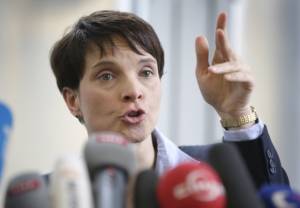First Slovakia, now Germany. Nationalist and far-right tendencies are becoming prevalent in Europe in wake of the great Muslim migration from the Middle East.
A new nationalist party that is challenging the German government’s welcoming stance toward migrants has come third in municipal elections in a central region, one week before three more important regional votes, preliminary results showed Monday.
The three-year-old Alternative for Germany, or AfD, received 13.2 percent of the votes in Sunday’s election for district councils in the state of Hesse, which includes the city of Frankfurt, an official tally showed.
Chancellor Angela Merkel’s conservative Christian Democratic Union received 28.2 percent — 5.5 points down from its tally five years ago — while the center-left Social Democrats got 28 percent, a 3.5-point decline. Those two parties govern Germany together. There also were losses for the Greens — who are part of Hesse’s state government.
AfD has campaigned against migration over recent months, switching its focus after initially concentrating on opposition to bailouts of eurozone strugglers. Polls indicate that the party, which isn’t represented in the national parliament, will perform strongly in state elections in Baden-Wuerttemberg, Rhineland-Palatinate and Saxony-Anhalt next Sunday.
AfD received 10.3 percent of the vote in Frankfurt, preliminary results showed. Final results are expected Thursday.

AfD leader Frauke Petry. (AP//Michael Sohn)
Party leader Frauke Petry celebrated what she called “phenomenal results.” She said in a statement that “the power of the established parties is crumbling.”
Merkel has accused AfD of fueling prejudices and offering no solutions. If the party wins 10 percent or more of the vote in state elections and perhaps enters the national parliament, “a great deal will change for the worse in our society,” senior Social Democrat lawmaker Eva Hoegl told ARD television.
In the town of Buedingen, the one council in Hesse where AfD didn’t run candidates, the far-right National Democratic Party saw its share of the vote climb from 2 to 14 percent. Officials are trying to ban the party.
Government spokeswoman Christiane Wirtz declined comment on that result.
The far-right in Europe has gained political clout over the course of the past months in wake of the mass influx of migrants from the Middle East, which they fear will irrevocably alter Europe’s millennia-old political, social, cultural and religious fabric.
By: AP and United with Israel Staff










